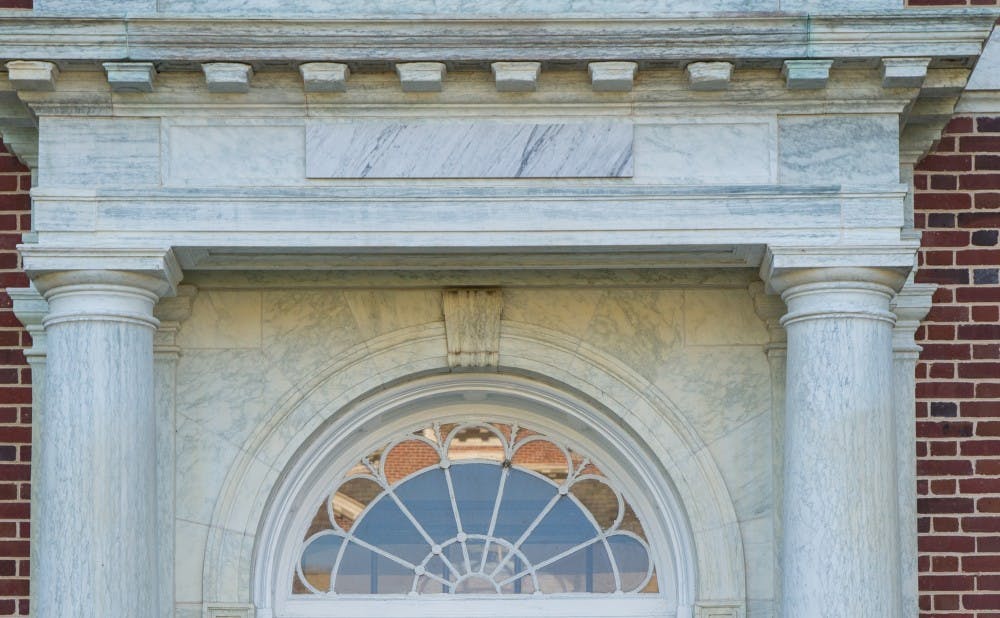Duke’s history department faculty released a statement in support of the Duke Graduate Student Union recognizing the “right of Duke graduate students to form an employer-recognized union” in early April.
“We will not penalize graduate students in any way for engaging in unionizing efforts nor will we endorse any disciplinary measures directed at graduate students who have participated in such efforts or against those who have not,” the statement read.
The history department is the first department at Duke to issue public support for the union.
Assistant Professor of History Justin Leroy and Associate Professor of History Jehangir Malegam, both members of the department's Graduate Advisory Committee, responded to The Chronicle’s request for comment in an email.
Leroy and Malegam referenced a 2016 National Labor Relations Board decision that affirms the legal right for graduate students to unionize as employees. Duke is currently challenging this ruling, arguing that the relationship between doctoral students and the University is “fundamentally different from that of employer to employee,” according to an email from Chris Simmons, interim vice president for public affairs and government relations.
“When students have exercised this right at other institutions, they have often faced retaliation. Regardless of the range of opinions on graduate student unionization among individual history department faculty members, we wanted to affirm this legal right and establish a commitment to non-retaliation for students who engage in unionization efforts,” the email read.
Drafting the statement
According to Leroy and Malegam, the doctoral and faculty members of the GAC collaborated to write the faculty statement of support together. Vivien Tejada, a sixth-year doctoral candidate in the history department and History Graduate Student Association co-chair, noted that most of the faculty statement was drafted by faculty members of the graduate-faculty committee, with minor comments from the HGSA.
The resolution from the HGSA requesting a faculty statement came at the same time as a separate HGSA resolution supporting the DGSU’s unionization efforts.
According to Tejada, the HGSA acts as a “liaison between faculty and students.” Avrati Bhatnagar, a sixth-year doctoral candidate in the history department and HGSA co-chair, also pointed to the role of the graduate-faculty committee, which works towards addressing “graduate student needs” and “changes in the graduate curriculum.”
During the DGSU’s card-signing campaign, the HGSA recognized the “need” to show support for the union drive, according to Bhatnagar. According to Tejada, the HGSA was also inspired by the Graduate and Professional Student Government’s statement in support of the union.
“So after their endorsement came out, we were like maybe we as a department could also do something similar. And we took this to the grad-fac committee, where we told them that we're sort of thinking of supporting the union,” Tejada said.
The two resolutions were drafted by Jacqueline Allain, a seventh-year doctoral candidate in the history department, and Clay Capra, HGSA secretary, DGSU co-representative for the history department and a first-year doctoral candidate in the history department. Both resolutions passed with “overwhelming” support, according to Allain.
“Be it resolved that the History Graduate Student Association (HGSA) requests formal endorsement of the Duke Graduate Students’ Union (DGSU) from the Department of History’s faculty … to endorse the DGSU and place its endorsement on the Department of History’s webpage,” the first resolution requesting faculty support for the DGSU read.
The second HGSA resolution endorsing the DGSU referred to issues “from the history department and beyond,” which included the rising cost of living in Durham, the lack of a “formal and effective” grievance process, “shoddy” protection for international students, difficulty acquiring year-long funding and “towering” continuation fees for upper-year students and dissatisfaction with health and dental insurance.
“The HGSA believes that the only way these issues will be fixed is through the acquisition of a fair contract, which will only happen through the union contract negotiations. Across the United States, graduate students are unionizing,” the second resolution read.
Looking forward
Faculty were “enormously in favor” of drafting the public statement, according to Leroy and Malegam. According to the HGSA resolution endorsing the DGSU, 70% of the graduate student body has already signed cards in favor of a union.
“[F]irst and foremost this was an opportunity to support our graduate students. But we also hope our resolution will spur similar discussions in other departments,” Leroy and Malegam read.
Doctoral candidates from the HGSA have similar hopes. Capra found it especially important that professors studying labor in the history department “[involved] themselves personally” in the campaign outside of a scholarly pursuit. He added that “in a perfect world,” the faculty statement would result in a “snowball effect” for other departments across Duke to show support for the DGSU.
Get The Chronicle straight to your inbox
Sign up for our weekly newsletter. Cancel at any time.
For Allain, this hope for support extended past doctoral candidates to undergraduates. She refers to the statement as one that is “also for [her] students and undergrads in general.”
“I want to see a different university come to be, though it may be a pipe dream, but this is part of that vision for a different kind of university,” Allain said.
Correction: The previous version of this article incorrectly said that the email from Leroy and Malegam was a collective statement from faculty members of the GAC. It was updated Monday morning to reflect that the email represents replies from Leroy and Malegam. The Chronicle regrets this error.

Audrey Wang is a Trinity senior and data editor of The Chronicle's 120th volume. She was previously editor-in-chief for Volume 119.

